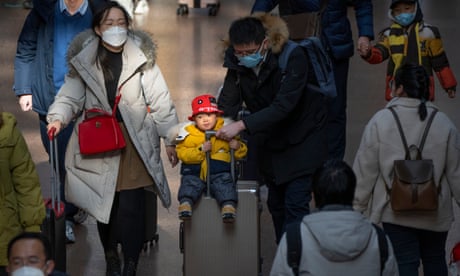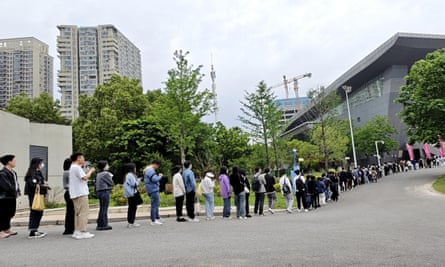With youth unemployment at a record high, the problem of overeducated young people is acute
Amy Hawkins Senior China correspondent
THE GUARDIAN
Thu 1 Jun 2023
With a master’s degree in applied linguistics from one of Australia’s top universities, Ingrid Xie did not expect to end up working in a grocery store. But that was where she ended up after graduating from the University of Queensland in July last year.
Xie did her undergraduate degree in China, studying English in the shade of palm trees at Hainan Tropical Ocean University. She went abroad for her master’s because she thought that would help her find a better job.

‘The last generation’: the young Chinese people vowing not to have children
But after working at a Korean supermarket in Brisbane for several months after graduating, in February she decided to return to her home city of Kunming, in the south-west province of Yunnan, to find a job as an English teacher.
Xie soon discovered that “a lot of people studied abroad and want the same thing”. She says a friend in the same city recently sat an English teacher recruitment test, along with about 100 other people. Her friend did not get the job.
Youth unemployment in China hit a record high in April, with 20.4% of 16- to 24-year-old jobseekers unable to find work. Xie is 26 and has not managed to find a job in China since leaving higher education. “It makes me really frustrated,” she says.
Nearly 11.6 million students are set to graduate in June, facing a labour market that looks increasingly hostile.
The problem of overeducated unemployed youths has become so acute that people have started comparing themselves to Kong Yiji, a fictional character from a story by Lu Xun, one of the greats of Chinese literature. Kong is a scholar turned beggar who is mocked by the locals at a tavern he drinks at for his pretentious airs.

With a master’s degree in applied linguistics from one of Australia’s top universities, Ingrid Xie did not expect to end up working in a grocery store. But that was where she ended up after graduating from the University of Queensland in July last year.
Xie did her undergraduate degree in China, studying English in the shade of palm trees at Hainan Tropical Ocean University. She went abroad for her master’s because she thought that would help her find a better job.

‘The last generation’: the young Chinese people vowing not to have children
But after working at a Korean supermarket in Brisbane for several months after graduating, in February she decided to return to her home city of Kunming, in the south-west province of Yunnan, to find a job as an English teacher.
Xie soon discovered that “a lot of people studied abroad and want the same thing”. She says a friend in the same city recently sat an English teacher recruitment test, along with about 100 other people. Her friend did not get the job.
Youth unemployment in China hit a record high in April, with 20.4% of 16- to 24-year-old jobseekers unable to find work. Xie is 26 and has not managed to find a job in China since leaving higher education. “It makes me really frustrated,” she says.
Nearly 11.6 million students are set to graduate in June, facing a labour market that looks increasingly hostile.
The problem of overeducated unemployed youths has become so acute that people have started comparing themselves to Kong Yiji, a fictional character from a story by Lu Xun, one of the greats of Chinese literature. Kong is a scholar turned beggar who is mocked by the locals at a tavern he drinks at for his pretentious airs.

Graduates look for work at a jobs fair in Haikou, Hainan province. Photograph: Shutterstock
State media has criticised these memes, accusing them of being self-indulgent. In March a commentary in state media said youths were “unwilling to engage in jobs that are lower than their expectations”.
China’s economy is suffering from a mismatch between the jobs available and the qualifications of jobseekers. Between 2018 and 2021 the number of graduates majoring in sports and education increased by more than 20%, according to Goldman Sachs.
But in 2021 the government suddenly banned for-profit tutoring, decimating an industry that had previously been worth $150bn. That eased the homework burden for schoolchildren but torpedoed jobs for young graduates, including Xie, who had previously looked at tutoring as a way of getting teaching experience.
The country is also struggling to fill jobs in the right places. Xie has seen job advertisements that require the teacher to work in a rural school for a year. “I don’t like [the idea of] teaching in a rural area as it is hard to survive in that environment, especially for girls,” she says.

State media has criticised these memes, accusing them of being self-indulgent. In March a commentary in state media said youths were “unwilling to engage in jobs that are lower than their expectations”.
China’s economy is suffering from a mismatch between the jobs available and the qualifications of jobseekers. Between 2018 and 2021 the number of graduates majoring in sports and education increased by more than 20%, according to Goldman Sachs.
But in 2021 the government suddenly banned for-profit tutoring, decimating an industry that had previously been worth $150bn. That eased the homework burden for schoolchildren but torpedoed jobs for young graduates, including Xie, who had previously looked at tutoring as a way of getting teaching experience.
The country is also struggling to fill jobs in the right places. Xie has seen job advertisements that require the teacher to work in a rural school for a year. “I don’t like [the idea of] teaching in a rural area as it is hard to survive in that environment, especially for girls,” she says.

A queue at a graduate jobs fair at Jianghan University in Wuhan, Hubei province, China, in April. Photograph: Shutterstock
Eric Fish, the author of a book about Chinese millennials, says the value of an international degree has diminished in China’s jobs markets. “Some recruiters think that students might have inflated expectations or are too westernised.”

China overtakes US in contributions to nature and science journals
The government is aware of the problem. In April it published details of a set of policies designed to stimulate the jobs market, including subsidies for companies that hire unemployed university graduates. The government wants state-owned enterprises to recruit 1 million trainees in 2023, and has set an overall target of creating 12m urban jobs this year, up from 11m in 2022.
This year the government also abandoned the use of the employment and registration certificate, a document that was used for decades to approve a graduate’s transfer from a university to an employer.
Although the certificate was mostly a bureaucratic relic, its cancellation would “make it more convenient for college graduates to seek employment”, the ministry of human resources and social security said in a notice on 12 May.
China is not alone in struggling to rebalance its economy after being battered by the Covid pandemic. Researchers at Goldman Sachs noted that in 2021 youth unemployment in several European countries was more than 20%, while in the US it was close to 10%.
But the dearth of opportunities also creates pressure to take any job regardless of interest, says Xie. “You don’t even know what you want to do when you’re 25.” For now she is resigned to spending a long time with her parents and looking after her cat, Shrimp. “What I’m looking for is enough private time and a job with work-life balance but I can’t find that.”
Additional research by Chi Hui Lin
Eric Fish, the author of a book about Chinese millennials, says the value of an international degree has diminished in China’s jobs markets. “Some recruiters think that students might have inflated expectations or are too westernised.”

China overtakes US in contributions to nature and science journals
The government is aware of the problem. In April it published details of a set of policies designed to stimulate the jobs market, including subsidies for companies that hire unemployed university graduates. The government wants state-owned enterprises to recruit 1 million trainees in 2023, and has set an overall target of creating 12m urban jobs this year, up from 11m in 2022.
This year the government also abandoned the use of the employment and registration certificate, a document that was used for decades to approve a graduate’s transfer from a university to an employer.
Although the certificate was mostly a bureaucratic relic, its cancellation would “make it more convenient for college graduates to seek employment”, the ministry of human resources and social security said in a notice on 12 May.
China is not alone in struggling to rebalance its economy after being battered by the Covid pandemic. Researchers at Goldman Sachs noted that in 2021 youth unemployment in several European countries was more than 20%, while in the US it was close to 10%.
But the dearth of opportunities also creates pressure to take any job regardless of interest, says Xie. “You don’t even know what you want to do when you’re 25.” For now she is resigned to spending a long time with her parents and looking after her cat, Shrimp. “What I’m looking for is enough private time and a job with work-life balance but I can’t find that.”
Additional research by Chi Hui Lin

No comments:
Post a Comment